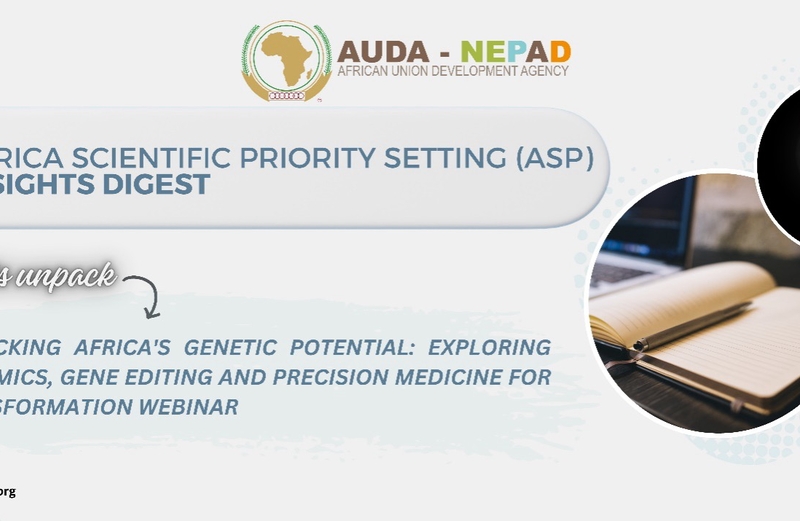Unlocking Africa's Genetic Potential: Advancing Precision Medicine for Public Health

In 2019, AUDA-NEPAD and AAS, in collaboration with the Alliance for Accelerating Excellence in Science in Africa (AESA) platform, launched the Africa Scientific Priority Setting initiative (ASP). This initiative aimed to define the agenda for research and investments in R&D and innovation, pinpointing the scientific priorities crucial for African research and development (R&D). Its goal was to customize agendas and investments to meet Africa's distinct needs and challenges. Through extensive consultations involving experts from diverse sectors, key research priorities covering healthcare, agriculture, climate resilience, and technological innovation were identified. These priorities were strategically chosen to ignite sustainable development, foster economic growth, and enhance overall well-being across the continent.
As an integral component of the dissemination and awareness-raising efforts for the ASP products pertaining to the nine priority areas, AUDA-NEPAD, in collaboration with the Calestous Juma Executive Dialogue platform and the ASP, organized a webinar themed "Unlocking Africa's Genetic Potential: Exploring Genomics, Gene Editing, and Precision Medicine for Transformation." This webinar provided a crucial platform for stakeholders to engage in substantive discussions concerning the implementation of precision medicine in Africa.
The quest to understand adverse drug reactions and provide tailored treatment has gained significant momentum, especially concerning drug reactions prevalent in regions such as South Africa. During the webinar, stakeholders delved into the potential of precision medicine in mitigating health risks by leveraging genetic insights to guide medication prescriptions, thereby enhancing patient safety and improving healthcare delivery efficiency.
Considerable attention has been directed towards identifying these reactions and administering appropriate treatments, particularly in cases where certain drugs, vital to Africa, have been associated with adverse effects. Presently, over 500 drugs are known to have genetic components influencing individual responses to medication, with approximately 50 of these drugs demanding prescriptions tailored to patients' genetic status. However, the implementation of precision-guided prescriptions remains a challenge within Africa's healthcare system.
Moreover, the webinar shed light on ongoing implementation projects aimed at driving the adoption of precision medicine in Africa. One such initiative highlighted was the EU-Africa PerMed project, which seeks to integrate African countries into the global personalized medicine research agenda through collaborative efforts between Europe and Africa. Through activities such as knowledge exchange, technology transfer, and capacity building in precision medicine, initiatives like these underscore Africa's steadfast commitment to advancing healthcare and fostering groundbreaking research.
In exploring the advancement of genomic medicine in Africa, stakeholders gained valuable insights into the strategic implementation of this innovative approach to healthcare. Through a comprehensive overview of the Framework for Genomic Medicine in Public Health, participants delved into the potential applications and challenges associated with integrating genomics and precision medicine into African healthcare systems.
Central to the discussions was the recognition of Africa's unique genetic diversity, emphasizing the need for tailored guidelines and policies to address these distinct genetic landscapes. Efforts are underway to establish genetic testing capabilities and repositories, which are crucial steps towards advancing precision medicine on the continent.
One key aspect emphasized was the need to strengthen infrastructure and technical capabilities to effectively implement precision medicine in Africa. There was also a focus on initiatives to integrate African organizations into global research agendas for precision medicine, indicating a move towards collaboration and knowledge sharing between Africa and other regions.
Despite the challenges, there is increasing optimism about the potential of precision medicine in Africa. With rising awareness and momentum, Africa is positioned to overcome hurdles and leverage the transformative benefits of precision medicine to enhance healthcare delivery and improve patient outcomes across the continent.
In summary, the ASP work, along with the recent webinar discussions, underscores Africa's commitment to harnessing scientific innovation for sustainable development. By aligning research priorities, leveraging local expertise, and fostering collaboration, Africa is positioned to propel sustainable development and enhance well-being. Through collective action and strategic investments, Africa's scientific potential can be fully realized, paving the way for prosperity across the continent.
